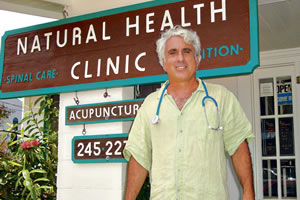Easing Suffering Naturally

Miles Greenberg: ‘Integrative medicine is the future’. Coco Zickos photo
Miles Greenberg, N.D.
Naturopath, Natural Health Clinic
What is a naturopath?
A general practitioner who uses natural medicine. The natural therapeutics are manipulative therapy like chiropractic, nutritional therapy, herbal therapy and homeopathy.
It’s a complete system of natural medicine using micro-dosages of animal, vegetable or mineral substances.
What is the difference between those who practice traditional medicine and natural medicine?
The similarities are we use the same textbooks and take a lot of the same classes as our allopathic colleagues, but in addition to that, we get all the different natural therapeutics.
An M.D. is a medical doctor and most prescribe pharmaceutical medicines to treat their patients.
In my practice my emphasis is to do my best to treat the cause of the illness and not suppress or cover up symptoms, which is all too often a common allopathic practice.
What is the history of naturopathy?
Naturopathy started in the late 1800s in New York City with Benedict Lust, who was an M.D., a D.O. (doctor of osteopathic medicine) and a naturopath from Europe. He formed the first school in Manhattan.
We had our humble beginnings there. Within two decades it was extremely popular and they say there were conventions of more than 10,000 naturopaths.
The practice dwindled in the early 1970s. There was only one school at that time that almost went out of business. Now the practice is growing like crazy.
What is your educational background and experience?
I graduated from UCSanta Cruz in pre-med. About a year after that, I went to National College of Natural Medicine in Portland, Ore., and acquired the naturopathic doctorate.
I’ve been practicing for about 20 years at the Natural Health Clinic in Lihu’e. Prior to Kaua’i, I was on the Big Island and practiced there for one year. I am licensed to practice in Hawaii.
Where are you from originally?
New Jersey.
What are some of the ailments people come to you for?
Because I am a general doctor, I see a wide variety of ailments. In my practice, I see childhood disorders from hyperactivity to autism to behavior disorders.
How do you treat them?
For pediatric disorders, I generally stick with lifestyle changes, manipulative therapy and homeopathy and nutritional therapy.
In this state, though, we also have prescriptive privileges; I can prescribe most everything except narcotic medications.
What is the most common ailment people come to you with?
I can’t say there is just one common thing. I do treat a lot of sports injuries and pain syndromes, though. I use a variation of chiropractic physiotherapy and a variety of injection techniques.
What is an example of the kind of treatment one can receive for pain?
Regenerative medicine. I’ve been using what they call platelet-rich plasma. It’s an autologous therapy using patient’s blood to prepare the therapy. The blood is spun down, and a concentration of platelets is prepared and injected into the injured or impaired tissues.
It’s a rapid and aggressive treatment. I’ve saved people from getting joint replacements, and very commonly reducing or eliminating pain medications.
That’s been especially rewarding because the results are exemplary.
What’s the most rewarding aspect of your practice?
Easing suffering. I see patients with conditions that nobody’s been able to help them with. These patients find me after many years of suffering.
What do you think is the method of treatment for the future?
Integrative medicine is the future.
There are many conditions that I can treat consistently better than my M.D. colleagues, and then there are conditions that my M.D. colleagues can treat more consistently than I do.
And the only way we’re going to do patients the best good is by learning from one another. In this way, we can serve the people we’re really sworn to serve in a more efficient manner.
What are your personal plans for the future?
What I’d like to do someday is to have an integrative, in-patient facility for general care allowing patients to be hospitalized under naturopathic and M.D. care working together. I also see myself doing something like holistic assisted living.
What is your best health advice for people?
Explore non-toxic, lowtech therapies with an emphasis on preventative medicine before a medical crisis, and you’ll save yourself much suffering.



